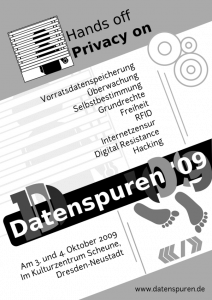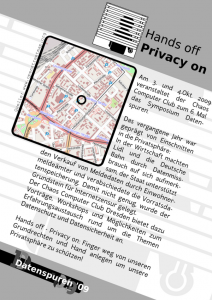During Easterhegg I held a workshop together with hc. It was about Buffer Overflows, which used to be the most common security vulnerability a couple of years ago.
We gave a talk explaining the basic concepts of processes and how they work on x86 machines. This was heavily packed with information and I really think we couldn’t make everything clear in the first run. But as it was planned as workshop, we intended to give people stuff they can chew on 😉 Basically, we took stuff from the excellent Phrack article Smashing the Stack for Fun and Profit which is nearly 13 years old by now.
As modern operating systems protect themselves against the consequences of buffer overflows, we prepared a virtual machine with QEmu/KVM so that exploits will work. It’s an old debian woody with an SSH daemon and build essentials.
Of course I have changed the image in the last minutes, because I wanted to improve it. And of course something went terribly wrong: The root filesystem was corrupted and fsck deleted important files, leaving the image in a useless state. We had to port my changes back to the old image.
Of course, we wanted to distribute the ~1GB image among our workshop guests. As we expected 50 people to show up and didn’t want to stress the WiFi so much, I intended to use BitTorrent, but it’s not as easy and smart as it could be: We are NATted, so using an external tracker would FAIL. Also, it can’t multicast the packets, which would perfectly make sense if many people start to download the torrent in the same network. We ended up having a usb pendrive and a thttpd serving the tarred image. Not very smart or efficient.
After the people ran that images, they couldn’t login with SSH due to a mysterious heisenbug. I suspect our last-minutes changes to be the culprit but I can’t provide a more technical error description. The SSH daemon worked quite well *in* the image, but as soon as you wanted QEmu to redirect the traffic into the machine, it FAILed: The connection was established, but no data was transferred. Could be a bug in QEmu as well.
The people either worked through the QEmu widget or set up a TUN device to get the network up and running…
That pissed some people off which then left. We ended up with 20 people trying to hack themselves 🙂
We prepared examples in the image, some of them copied from Gera, e.g.:
/* stack1.c *
* specially crafted to feed your brain by gera */
int main() {
int cookie;
char buf[80];
printf("buf: %08x cookie: %08xn", &buf, &cookie);
gets(buf);
if (cookie == 0x41424344)
printf("you win!n");
}
The people were supposed to make the program print “you win!”. If you know, how a stack works, it’s actually simple. Do you know, what input you have to feed in order to win!?
Oh, you don’t want to compile this program with anything other than -O0 because the compiler rearranges the variables on the stack so that you can’t overwrite the integer…
In the end, I think I am satisifed with the workshop, although things could have worked better. We had pretty smart people which were really curious how stuff works. They have learned a lot and I guess they had fun with that as well 🙂







